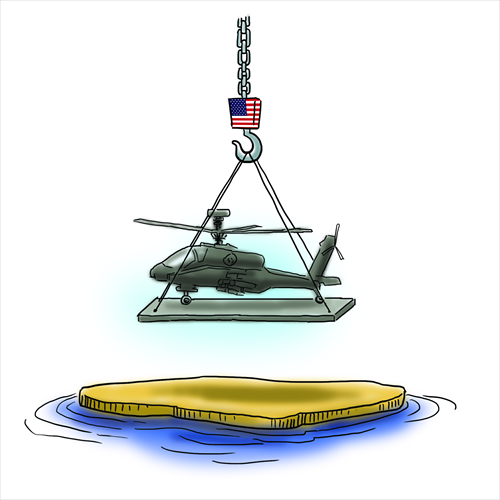Symbolic gain for US in arms sales to Taiwan

Illustration: Liu Rui/GT
Bloomberg reported in a recent article that the White House is about to announce an arms deal with Taiwan worth $1 billion in mid-December. This will mark the first military equipment sales since 2011. The four-year gap is the longest period of time without arms sales between the two since the US Congress approved the Taiwan Relations Act in 1979.
Considering the recent escalation of tensions between China and the US, Washington has picked a delicate time to play an old trick to reinforce its pivot to Asia, a strategic architecture to contain China's growing influence in the Asia-Pacific region.
Recent years have seen the US conducting a strong-headed intervention in the South China Sea disputes, offering partial support to the relaxation of Japan's collective self-defense, and plotting a regional trading agreement - Trans-Pacific Partnership - without China's participation. The upcoming arms sales to Taiwan serve the general strategic purpose of the US as well.
An arms deal with Taiwan amid simmering tensions will further jeopardize the faltering mutual trust and raise the risks of conflicts between China and the US. Analysts speculate that Beijing may issue a stern warning or even make countermeasures against Washington on this matter.
Beijing will undoubtedly frown on the obvious provocation, which taps on the "core interests" China insists on.
Washington's efforts to provide military aid to Taiwan aim at avoiding a serious imbalance of military capabilities between the mainland and Taiwan. However, as the mainland has far surpassed Taiwan in military strength, a small-scale export of frigates, or assault vehicles from the US will do little to alter the structural asymmetry.
Washington is well informed of the current landscape between the Chinese mainland and Taiwan. Since its main significance is dying out, the arms deal has only symbolic meanings.
From US perspective, the arms deal could be a response to Congressional pressures. Washington now faces more setbacks than progress in security and diplomatic issues across the world, especially in the Middle East. The arms deal could more or less buoy a brawling and grim Congress, showing them that the US is still making progress in its rebalancing to Asia and countering its future major rival.
By the arms deal, Washington also intends to send a signal to the Chinese mainland and Taiwan that it is not giving up intervention into the cross-Straits relations, especially on the eve of Taiwan's regional election. This is Washington's common gesture to reiterate its "solid" relationship with Taiwan.
Moreover, as for the US, selling arms to Taiwan before US President Barack Obama's term of office is nearly finished is a plausible tactic. This could save a new president future troubles with Beijing on this matter. The arms deal, if conducted by a new US president, would cause more damage to the Sino-US relationship than if done by a retiring president.
The superfluous arms deal does not strengthen Taiwan's military defense. Even with US reinforcements, Taiwan still doesn't have a chance to gain a competitive edge if there is a physical confrontation with the mainland. The deal is actually worsening its position in the cross-Straits relations, which call for reconciliation and cooperation instead of opposition.
The deal will reinforce China's strategic focus and confidence in dealing with the increasingly complicated Sino-US relations. Beijing is likely to utter a rebuttal, but it won't resort to actual countermeasures. Beijing's response indicates the fact that China is more committed to gaining initiative and sticking to its own pace in coping with the US. This trend will disappoint Washington in more regional affairs.
The author is a professor at the Guangdong Research Institute for International Strategies. opinion@globaltimes.com.cn